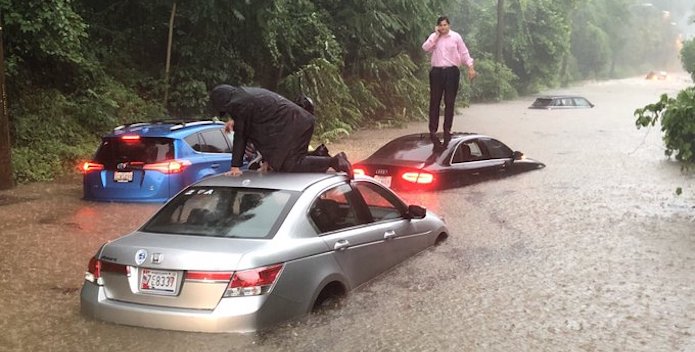You may have noticed it’s been a little wet in the Washington D.C. area lately.
In fact, this past Monday 3.3 inches of rain fell on Reagan National Airport during a one-hour period—that’s about a month worth of rain. Available records indicate that this was the heaviest one-hour rain total since 1936. During Monday’s torrential downpour, D.C. issued its first ever flash flood warning, as did nearby Alexandria and Arlington.
The Washington Post crunched the numbers and found that 3 billion gallons of water came down in the D.C. city limits alone. To put that gargantuan number into perspective, that is enough water to fill 27 million bathtubs. When including the rest of the metro area in Maryland and Virginia, the total reached nearly half a trillion gallons.
2018 was the wettest year on record for Washington. This year has already been incredibly wet. Is this the new normal?
According to the D.C. Department of Energy and Environment’s own analysis, due to climate change, these 1-in-100-year storms are expected to become 1-in-25-year events by mid-century, making significant rainfall events four times more likely to occur. District residents should not only expect more river and tidal flooding, but also more urban and flash flooding.
What can D.C. residents, businesses, and the city itself do to be better prepared for more rain in a changing climate? The good news is that there are several natural and nature-based solutions that help mitigate these extreme events.
We can slow down and soak up floodwater by turning parking lots into parks, planting trees along streets and vegetation along shorelines, building green roofs, and planting rain gardens in our yards. In addition to helping us adapt to the increased challenges climate change brings, many of these techniques also lead to cleaner water in our rivers, creeks, and the Chesapeake Bay. And these solutions are incredibly cost-effective.
Polluted runoff is one of the most harmful sources of pollution to the Bay and its rivers. When rain falls on impervious surfaces like roads, rooftops, parking lots, and sidewalks—which are all plentiful in D.C.—that rain quickly rushes off those hard surfaces, taking any and all pollution with it on its way into our local waterways.
Through these nature-based solutions, like rain gardens and green roofs, we’re able to use nature’s own systems to soak up this polluted runoff before it enters our local waterways.




